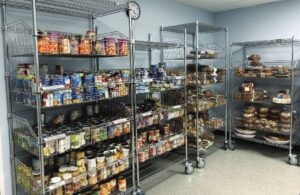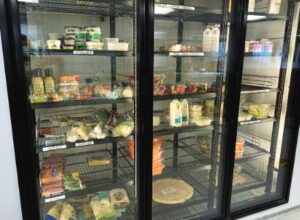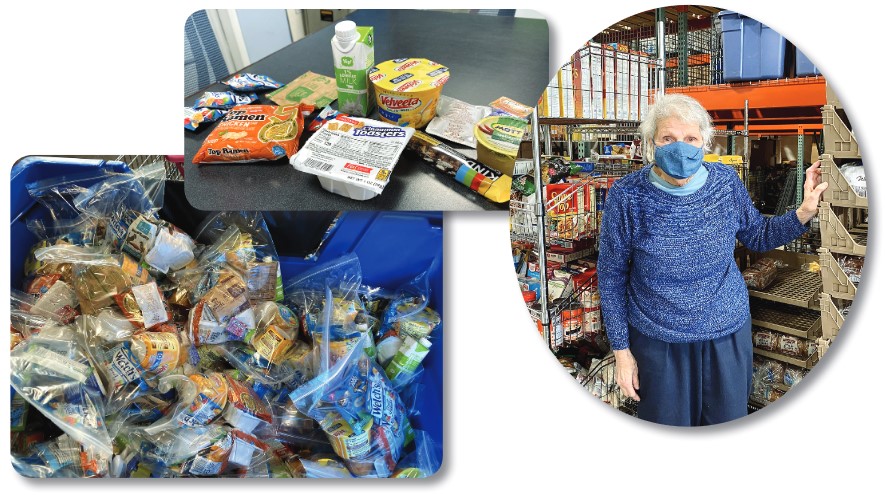Posted on May 24, 2021
Business is booming for one of Temple Beth-El’s community partners, but its uptick in clients is bittersweet.
In the past year, at least 100 additional families have come to rely on the Food Bank Network of Somerset County warehouse in Bridgewater each month for food, raising to 317 the number of families that depend upon the organization each month for grocery staples. TBE is a key reason why the Food Bank Network is able to meet the growing demand, thanks to semi-regular food drives and financial donations.
Helping to lead TBE’s role in addressing community hunger is David Kornberg, who has worked with the Food Bank Network on behalf of TBE for approximately 15 years, following even earlier efforts and support by Sid and Shuey Horowitz and Liz Cohen.
The COVID-19 pandemic has exacerbated the struggle that many families face to put food on their tables as people were laid off or had working hours reduced significantly. TBE has stepped up by organizing several food collection drives during the current temple year, Kornberg said. The food drives have been carefully coordinated to bookend events such as drive-through challah chibbuks in the temple parking lot, while also addressing the current needs of the Food Bank Network.
“Feeding families is just a problem that doesn’t seem to go away,” Kornberg said. “It hasn’t dissipated in any way, shape or form.”
TBE’s ongoing assistance has been a lifeline for those in need, according to Marie Scannell, the longtime executive director of the Food Bank Network.
“The majority of our foods come from churches and synagogues. We have come to really rely and count on you,” she said of TBE. “David’s been wonderful. He knows what we need and he does it.”
Kornberg explained that the Food Bank Network’s clientele includes first-time users who never expected to need help or struggle to feed their families.
“The virus doesn’t know economic class but I think in some ways it does,” he said. The people who can least afford to be out of work are the ones on the front lines. To a large extent they’re in customer-facing jobs and have been impacted a lot. Certainly the virus has hit all sorts of people who would never have expected to have been affected.”
 Just as food bank client demographics have changed over time, so too has the process of getting food to clients and the types of groceries needed.
Just as food bank client demographics have changed over time, so too has the process of getting food to clients and the types of groceries needed.
With its recent move to new headquarters at 7E Easy St., in Bridgewater, the Food Bank Network now has room for several refrigerated cases and can provide groceries beyond canned goods, pastas and packaged meals. Today the Food Bank Network also provides clients with breads, fresh produce, fruit, yogurt, frozen items and a variety of meats.
Instead of handing each family a bag of predetermined grocery items, Food Bank Network clients now receive a number of bags based on their family size and can choose their own grocery items when they visit each month.
The self-service format reduces waste of items perhaps not wanted or needed in a predetermined bag of groceries and allows families to choose what foods they prefer. 
“People are going for healthier things,” said Scannell, who has worked with the Food Bank Network for 30 years.
In addition to serving its regular clientele monthly at its headquarters, the Food Bank Network operates food pantries on Saturdays at Shiloh Pentecostal Church in Somerville, the Presbyterian Church at Bound Brook, and the North Plainfield Vermeule Community Center.
Scannell was the local welfare director for North Plainfield and Bound Brook years ago when Marguerite Chandler surveyed all local welfare directors to assess needs in the communities they served. Chandler eventually visited the local welfare offices, asking for volunteers to help with a new food bank program to better address hunger in the community. Scannell was among the volunteers at the time to step up and help. That volunteer work eventually led to Scannell becoming the executive director – a position she has held for the past 25 years.
To meet growing demand, Scannell is laser-focused on being frugal with expenses, minimizing waste to ensure dollars and food donations go far, and using humanism to serve those in need.
 One of the Food Bank Network’s newer initiatives is the Backpack Program, which provides gallon-sized bags to children in need who may not have sufficient food to get through the weekend. The bags are assembled at the Food Bank Network warehouse and distributed weekly to six area schools serving more than 200 children. School nurses discreetly distribute the bags to children in need, who go home with a variety of nonperishable foods including snacks, mini cereal boxes, small containers of juice and more.
One of the Food Bank Network’s newer initiatives is the Backpack Program, which provides gallon-sized bags to children in need who may not have sufficient food to get through the weekend. The bags are assembled at the Food Bank Network warehouse and distributed weekly to six area schools serving more than 200 children. School nurses discreetly distribute the bags to children in need, who go home with a variety of nonperishable foods including snacks, mini cereal boxes, small containers of juice and more.
With the school year wrapping up and the major holidays months away, Kornberg notes that need doesn’t diminish in warmer months. In fact, it may even be stronger.
“In the fall and especially the winter holiday season, people start feeling more benevolence toward one another and feel motivated to give turkeys at Thanksgiving and things at Christmas and Chanukah,” he said. “But a family of four is going to have to eat in July as well as in December. It’s a year-round need, especially in the summer months. When people are not thinking about it is when supply becomes even more important. That’s one of the reasons we try to be more consistent throughout the year.”
Kornberg says “countless persons” from TBE have contributed in a variety of ways to help the Food Bank Network, and that assistance provides its own reward.
“When I personally go with the temple community and drop off the food and I’ve had the opportunity to walk around the actual Food Bank Network building and talk to Marie and some of the volunteers and see how grateful they are for our contributions, it’s a wonderful feeling knowing that we’re trying to do the right thing,” Kornberg said. “You feel like you can never do enough. It’s very nice to try to help those in need.”
How to Help:
Originally published in the May-June 2021 issue of the Shofar. For more issues of the Shofar, visit the Shofar archives.